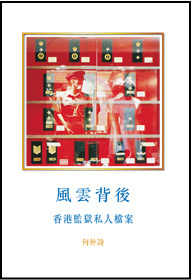昨日下午走進亞洲文化合作論壇,主題是「文化核心價值與中國的現代性」,終於趁了時髦,聽聽于丹老師的現場版。于老師提到張載的“爲天地立心,爲生民立命,爲往聖繼絕學,爲萬世開太平。”又提及近來開始領略孔子的“老者安之,少者懷之,朋友信之。”
牟宗三也曾同時論及二人的話:
我現在已無現實上的鄉國人類之具體的懷念。我只有這麽一個孤峭的,掛了空的生命,來從事一般的,抽象的,足以安定人生建立制度的思想系統之釐清。這只是抽象的懷念,對於“人之爲人”的本質之懷念。以前孔子說:“老者安之,少者懷之,朋友信之。”了了數語,真是王道之大端。現在不但是老者少者須要安懷,一切人都須要安懷。這就必須從新來一個文化的反省,思想系統的釐定。張橫渠說:“爲天地立心,爲生民立命,爲往聖繼絕學,爲萬世開太平。”這四句話,在這裏真有其切實的意義,並非是空洞的大話。我們往常不解。我現在才真正感到了。試想在這個拔了根,落了空的時代,人類真是沒有命了。這如何能不須要“爲生民立命”呢?天地以生物爲心。人類沒有命了,天地的心在那裏?所以“爲生民立命”,也就是一個仁心之不容己,也就是“爲天地立心”了。往聖千言萬語,所念念不忘者,總在此事,這不是科學所能擔負的。所以在科學以外,必須承認有道德宗教的聖賢學問。所以爲生民立命,爲天地立心的大業,也就是爲往聖繼絕學,爲萬世開太平了。我以前有詩雲:“上蒼有眼痛生民,留取丹心爭剝復。”我現在也只有這一點丹心,尚未泯滅。
四十二年二月(人生雜誌)
記得當年中六,第一堂中文課,老師張太問我們為甚麼繼續升學,同學一一回答了,她跟著便在黑板上寫了橫渠先生這四句話,我抄了下來,回家寫在日記的第一頁,便是這樣,以後一直能牢記。
“老者安之,少者懷之,朋友信之。”原也是讀過,但昨日聽老師提起,加上腦裡還剩著下崗書友剛剛的留言,倍有感受。
起承轉合,到了人生的中段,氣派如何磅礡,也要轉一轉,最終始能有完整結局收場。說到志向,孔夫子只是說“老者安之,少者懷之,朋友信之。”
安之、懷之、信之,是樂事,何苦之有?
儒家的人生,由始至終都是說樂不說苦,論語一開始便是學而時習之,不亦說乎?讀書,不過是高高興興的一回事,做讀書人,自然也是快快樂樂的一回事。
2007/07/26
訂閱:
發佈留言 (Atom)







3 則留言:
In my feedback I wrote: 真正的知識份子(有別於知識匠)不應追求自身的快樂,否則前人的苦心經營便會付諸東流。
With the benefit of Joyce’s citations, I’d like to add some remarks in the brackets as follows. 真正的知識份子…不應追求自身的快樂 (牟宗三 might be a good example:“我只有這麽一個孤峭的,掛了空的生命… 我現在也只有這一點丹心,尚未泯滅” -- 牟宗三 ),否則前人的苦心經營便會付諸東流 (Again,“在這個拔了根,落了空的時代,人類真是沒有命了…往聖千言萬語,所念念不忘者,總在此事…”-- 牟宗三 ). Sigh!
Moreover, I’d like to elaborate more the statement “真正的知識份子…不應追求自身的快樂” 。 What I was referring to is a “fundamental option”, a basic attitude towards intellectual life; it does NOT contradict with the happy feeling we have in our daily life, for instant, the wonderful moment we experience when playing with a lovely baby. That’s why I asserted that “選擇做個真正的知識份子便等同放棄快樂(不過,他們還可以在平安中憂國憂民的)”Intellectuals can’t find ways out without peace (at heart) or a clear mind. And, logically, not opting for “happiness” does NOT imply opting for “pain”. [Don’t wish to discuss logical arguments of this kind here. Any ordinary textbook on “Introduction to Logic” is more than enough to give us the necessary hints. ]
I doubt if Hu Jingtao or Wan J.B. (I call them ‘practical intellectuals’) are happy when dealing with the San Nong problems, regional disparities, migrant workers… Of course, I suppose they are, when the policies implemented could successfully help our people a bit. That’s exactly what the kind of“後天下之樂而樂”I cited.
In the west, not long ago, we had B. Russell who said no to nuclear weapons and was put behind bars because of his protest. Was he made for a happy life? “Three passions, simple but overwhelmingly strong, have governed my life: the longing for love, the search for knowledge, and unbearable pity for the suffering of mankind.” --- Bertrand Russell. Is Russell happy?
“儒家的人生,有始至終都是說樂不說苦,論語一開始便是學而時習之,不亦說乎?讀書,不是高高興興的一回事,做讀書人,自然也是快快樂樂的一回事。”To an undergrad this seems to be true in Confucian sense (dear Joyce, remember the “first love” in my analogy*? Do make this clear to Tony, lest he’d misunderstand :)). But for scholars like饒宗頤, he experiences and has to face loneliness in the academic journey. There’s something beyond happiness for an old ‘couple’. [*Love and academic discipline, an analogy: undergrad VS first love; master (research degree) VS cohabitant; Ph.D. VS spouse (in marriage); post-doc period VS honey moon; master (taught program) VS casual courtship; short program VS one-night stand] BTW, 饒宗頤’s case is a very special one; he fell in love with Chinese studies when he’s only a teenager, and kept this puppy love ‘who’ has made him lonely for ages. Is he happy?
When hundreds of “intellectual craftmen”are making money HAPPILY in Beijing, in the Department of Sociology, Peking University, there’s Prof. Xie Lizhong who puts aside everything (including remunerations in monetary terms) but focusing on writing papers, translating western writings, with a view to producing more teaching materials for the students, so that the latter can learn more about sociological theories, and can do more good to our people (including our lovely and simple peasants in the farmhouse, whose parents/ grandparents might be among those being tortured by the Japs during WWII). I reckon Prof Xie doesn’t have much choice since he fundamentally opted for this very academic way. “起承轉合,到了人生的中段,氣派如何磅礡,也要轉一轉,最終始能有完整結局收場。”is no longer his concern, I believe; he doesn’t see himself in the mirror, neither Prof. Yun Sun Bong with HK Polytechnic University.
Of course, intellectuals never decline “happiness” when they bump into the latter accidentally; otherwise they’re not intellectuals but idiots.
I believe in principles and directives like“老者安之,少者懷之,朋友信之。”. But did Confucian foresee the enlightenment and subsequent modernization and capitalism in the west? How about the globalized consumerism brought forward by the ever expanding capitalism that has knocked down communism (not socialism, yet)?
Some scholars (neo-Confucian included) in China are optimistic and expect Confucianism could be our exit. I know extremely little about Confucianism. Hope they’re right.
One article to share with you before putting down my ‘pen’: “The Clash of Civilizations” by Samuel Huntington. Pls check the details with Wikipedia. The 21st Century Bimonthly (CU) has published the Chinese version in Oct 1993 issue #19.
Hope one day we can sit in the same classroom again. I treasure this kind of discussions. Thanks for broadening my view.
下岗
人生最快樂的事還不是找到安身立命之所,不管是埋於書堆,逍遙自在,還是要救國救民,胸懷萬里。所以我老是不明白為甚麼簡單的道理總是要看得人消化不良似的,知識份子的矯情是也。
01010111 01101000 01100001 01110100
01100001
01110010 01100101 01100100 01110101 01100011 01110100 01101001 01101111 01101110 01101001 01110011 01110100
00100001
下岗
發佈留言